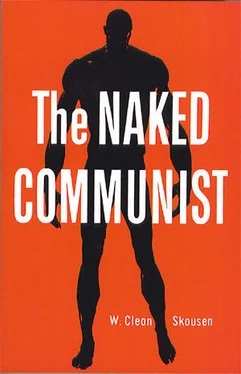• Why do Marxist writers call their founder a “genius” yet frankly admit he was “a violent, quarrelsome, contentious man, a dictator and a swashbuckler”?
• Was Marx well educated? What was his nationality? Where did he do most of his revolutionary writing?
• How was it that Marx never acquired a profession, an office, an occupation or a dependable means of livelihood?
• How did Engels differ from Marx?
• What were the six principal goals which Marx and Engels set forth in the Communist Manifesto ?
• Why did Marx believe one of his first tasks was to “de-throne God”? Why did he think his book, Capital, would change the world?
• Why did Marx fail in his two attempts to create organizations for the promotion of world revolution?
On a chilly, foggy day in 1853, a British government official stood in the drizzling rain before the doorway of a human hovel in the heart of London’s slums. He knocked and after a short delay was admitted. As the officer entered the room thick clouds of smoke and tobacco fumes billowed about his head causing him to choke and cough while his eyes watered. Through the haze he saw the proprietor of the slum dwelling, a barrel-chested man with disheveled hair and a bushy beard. The man greeted the officer in a strong German accent, offered him a clay pipe and then motioned him toward a broken-backed chair.
If the officer had not known better he would never have guessed that the bushy-bearded man who sat before him was a graduate of a university with a Ph.D. degree. Nor that the wife who had just hustled the children into a back room was the daughter of a German aristocrat. Yet such was the case. This was the residence of Dr. and Mrs. Karl Marx.
At the moment Karl Marx was a political fugitive—having been driven from Germany, France and Belgium. England had granted him domicile along with other revolutionary leaders from the Continent and for this Marx was grateful. It gave him a lifelong base from which to continue his revolutionary work.
On this particular day the presence of the officer was no cause for alarm. It was the routine check which the British Government made on all political exiles living in England. Nor was the officer hostile. He found the Marxes strange but interesting people who could engage in very lively conversation on world problems while sitting blissfully in a domestic environment of incomprehensible confusion. The officer later included his puzzled observations concerning the Marxes in his official report:
“(Marx) lives in one of the worst, therefore one of the cheapest, neighborhoods in London. He occupies two rooms. The room looking out on the street is the parlor, and the bedroom is at the back. There is not one clean or decent piece of furniture in either room, but everything is broken, tattered and torn, with thick dust over everything and the greatest untidiness everywhere. In the middle of the parlor there is a large old-fashioned table covered with oilcloth. On it there are manuscripts, books and newspapers, as well as the children’s toys, odds and ends and his wife’s sewing basket, cups with broken rims, dirty spoons, knives and forks, lamps, an ink-pot, tumblers, some Dutch clay-pipes, tobacco ashes—all in a pile on the same table…. But all these things do not in the least embarrass Marx or his wife. You are received in the most friendly way and cordially offered pipes, tobacco and whatever else there may happen to be. Eventually a clever and interesting conversation arises which makes amends for all the domestic deficiencies.” {1} 1 Wilson, Edmund, To the Finland Station , pp. 217-218.
Thus we are introduced to one of the most dramatic personalities to cross the pages of history during the nineteenth century. And one who would have a greater impact dead than alive. Biographers would grapple with the enigma of Marx’s life. At one moment Marx would be called “the greatest genius of this age,” and a moment later even his disciples would feel forced to call him “a violent, quarrelsome, contentious man, a dictator and a swashbuckler, one at feud with all the world and continually alarmed lest he should be unable to assert his superiority.” {2} 2 Ruhle, Otto, Karl Marx , pp. 209-308.
Such were the contradictory, surging forces of human dynamics which found expression in the turbulent personality of Karl Marx.

Karl Marx: “ If we can but weld our souls together, then with contempt shall I fling my glove in the world’s face, then shall I stride through the wreckage a creator.”
The Early Life of Karl Marx
Karl Marx first saw the light of day at Treves, Germany, May 5, 1818. He certainly had no need to apologize for his progenitors. For many generations his male ancestors on both sides had been outstanding scholars and distinguished rabbis. However, the father of Karl Marx decided to break the ties of the past both religiously and professionally. He withdrew his family from the local synagogue to join the congregation of a local protestant faith and then reached out after professional recognition as a practicing attorney. Karl Marx was six years of age when the traditional moorings of the family were thus uprooted, and some biographers of Marx attribute his rejection of religion in later years to the conflicts which this sudden change in his life precipitated.
In elementary school young Karl revealed himself to be a quick, bright scholar. He also revealed a quality which would plague him the rest of his life—his inability to keep a friend. Seldom, in all of Marx’s writings, do we find a reference to any happy boyhood associations. Biographers say he was too intense, too anxious to dominate the situation, too concerned about personal success, too belligerent in his self-assertiveness, to keep many friends. However, Karl Marx was not lacking in sentiment and genuine hunger for affection. At 17, when he began his university career, the letters which he wrote to his parents occasionally unveiled deeply sentimental, woman-like feelings. Here is an example:
“In the hope that the clouds which hang over our family will gradually disperse; that I shall be permitted to share your sufferings and mingle my tears with yours, and, perhaps, in direct touch with you, to show the profound affection, the immeasurable love, which I have not always been able to express as I should like; in the hope that you, too, my fondly and eternally loved Father, bearing in mind how much my feelings have been storm-tossed, will forgive me because my heart must often have seemed to you to have gone astray when the travail of my spirit was depriving it of the power of utterance; in the hope that you will soon be fully restored to health, that I shall be able to clasp you in my arms, and to tell you all that I feel, I remain always your loving son, Karl.”
Such expressions must have puzzled the elder Marx. Throughout his career as a father he was never able to counsel or cross this hot-tempered son without precipitating an emotional explosion. The letters of Karl Marx make frequent reference to the violent quarrels between himself and his parents; the letters from Karl’s parents complain of his egoism, his lack of consideration for the family, his constant demands for money and his discourtesy in failing to answer most of their letters.
It was in the fall of 1835 that Marx entered the University of Bonn to study law. This was a hectic year. He scandalized his parents by joining a tavern club, running himself deeply in debt and almost getting himself expelled for “nocturnal drunkenness and riot.” His studies were most unsatisfactory and he threatened to become a professional poet instead of a lawyer. In the summer of 1836 he fought a duel and received a wound over the eye. It was finally decided that it would be better for the University of Bonn if Karl Marx transferred to some other university. The elder Marx heartily agreed. Karl was sent to Berlin.
Читать дальше












